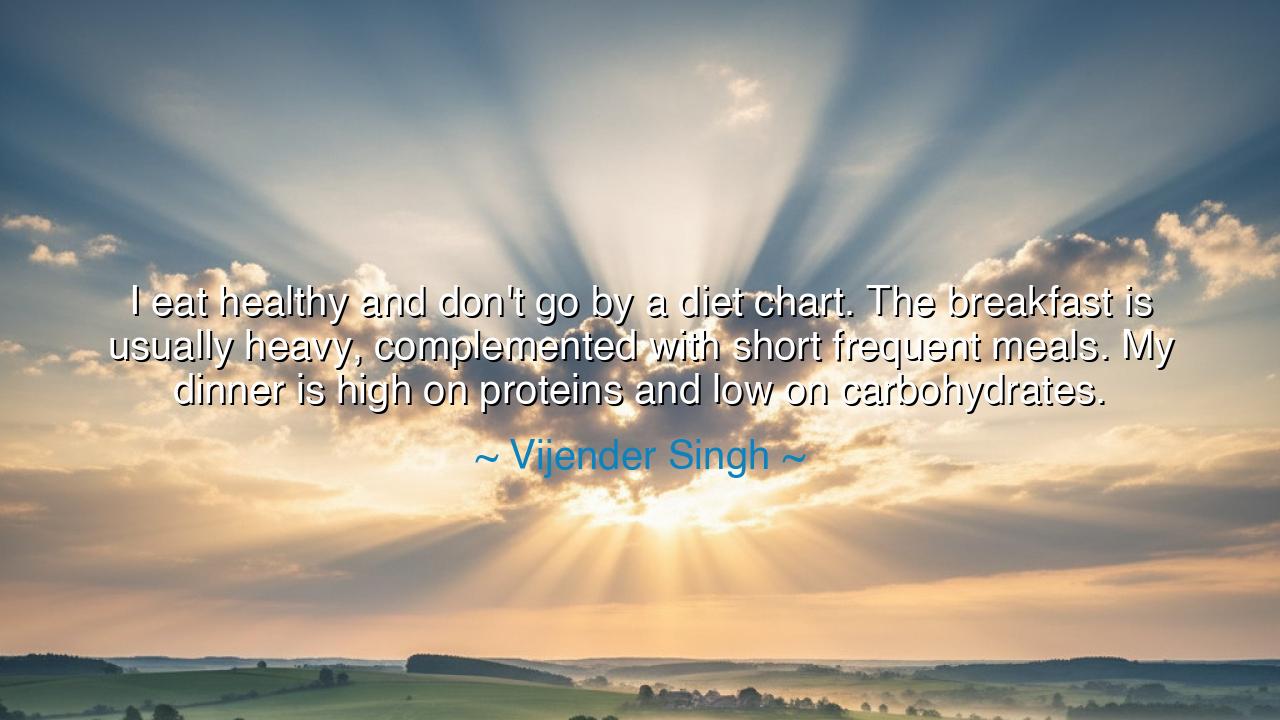
I eat healthy and don't go by a diet chart. The breakfast is
I eat healthy and don't go by a diet chart. The breakfast is usually heavy, complemented with short frequent meals. My dinner is high on proteins and low on carbohydrates.






In the vast and ancient wisdom of the world, where the pursuit of strength, balance, and vitality has been the guiding force for countless generations, Vijender Singh offers us a glimpse into a way of living that respects the body as both a temple and a tool for greatness. "I eat healthy and don’t go by a diet chart. The breakfast is usually heavy, complemented with short frequent meals. My dinner is high on proteins and low on carbohydrates." These words speak not merely of a way of eating, but of a philosophy—a balance between nourishment and performance, a commitment to honoring the body with care and precision.
In the ancient world, those who sought excellence in both mind and body understood that the food we consume is not just a means of survival, but a foundation for greatness. The great warriors of old, like those of Sparta, did not simply feast on anything they could find. They understood that the body was a weapon, a tool for achieving great deeds. Their diet was simple, yet nourishing, designed to fuel not just their physical strength, but their mental clarity and resilience. Vijender Singh echoes this ancient wisdom in his approach to nourishment. His refusal to be bound by rigid diet plans, and his commitment to eating what fuels his strength, aligns with the heroic figures of history who ate with intention and purpose.
The ancient Greeks, whose civilization laid the foundation for much of Western thought, placed great value on moderation in all things, including diet. Hippocrates, the father of medicine, advised his followers to seek balance in their lives and to eat not for indulgence, but for sustenance. He famously said, "Let food be thy medicine, and medicine be thy food." In this spirit, Vijender Singh speaks of his own diet not as a form of deprivation, but as a conscious, mindful choice to nourish his body with what it needs to thrive. Like the ancient philosophers, he does not follow a diet chart, but listens to the needs of his own body and adapts his meals to what sustains his strength.
Consider the legendary Alexander the Great, whose military campaigns were fueled not by grand feasts, but by simple, nutritious meals that gave him the strength to lead armies across vast territories. Though the life of a conqueror is often associated with indulgence and luxury, Alexander understood that true power lay not in excess, but in discipline. He ate to fuel his body, not to satisfy fleeting desires. This philosophy is reflected in Vijender Singh's approach: his breakfast is hearty, his meals frequent and balanced, and his dinner focused on high protein to repair and build. In the same way, Alexander’s diet supported his incredible feats, Vijender understands that nourishment must be strategic, tailored to the demands of both body and mind.
In the teachings of Aristotle, balance and self-discipline were central to the good life. He believed that to live a virtuous life, one must master their desires and act in harmony with nature. The body, he argued, should not be overindulged, nor denied; instead, it should be treated with respect and provided with what it needs to be strong and healthy. Vijender Singh follows this path of moderation, embracing a diet that does not go to extremes but seeks to nourish his body with the right balance of proteins, carbohydrates, and fats. By listening to his body and adapting his meals, he ensures that his energy is sustained without falling into the trap of overindulgence.
The lesson we take from Vijender Singh is one of awareness and intentionality. It is a reminder that true health is not found in restrictive diet charts or fleeting trends, but in a balanced approach to nourishment—one that honors the body as a whole. The key to strength, both physical and mental, lies in the ability to listen to the needs of the body and adapt accordingly. Like the warriors of old, we must nourish ourselves with intention, fueling our bodies with the right foods at the right times, and not allowing ourselves to be led by external dictates.
So, let us embrace Vijender Singh's wisdom as we walk our own paths. Let us learn to eat with purpose, to balance our meals in a way that sustains our strength, and to honor our bodies with the respect they deserve. Like the ancient warriors, we must treat our bodies as sacred vessels, carefully nourishing them to achieve the greatness that lies within. The journey to health and strength is not one of extreme measures, but of moderation, balance, and wisdom—principles that have guided humanity for centuries, and that will continue to serve us well for generations to come.






AAdministratorAdministrator
Welcome, honored guests. Please leave a comment, we will respond soon